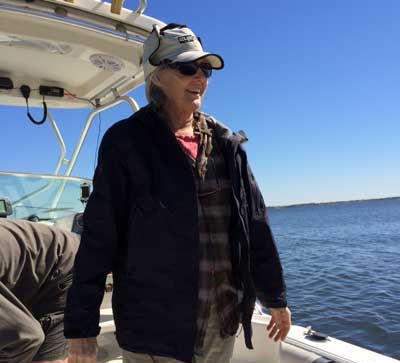Boating in Florida
How Much Fun Can You Have Boating in Florida?
Boaters and fisherman around the world come to Naples, Florida to enjoy our beautiful waters. Why? Because boating and fishing is excellent here! We have hundreds of miles of freshwater, brackish, and saltwater areas throughout the county for fishing or just observing nature.
Departing Locations
In coastal communities a large majority of homes near the coast are waterfront, so most residents living on the water own a boat for fishing or cruising. If you live inland and trailer your boat visit our Boat Launch Sites page for locations. We also have Marina's in most locations, visit our Marinas page for their locations. Our Locations menu has pages with information on the areas in our county and details on how to fish them.
Before You Go Boating
Creating good boating habits when preparing for departure will ensure a fun boating day. Boating is a part of our life here and we all take safety seriously. Before you venture out on the waters in Florida fishing, you should familiarize yourself with our rules & regulations for a safe trip, see our Boating Regulations page for more details.
Boating Checklist
Here is a quick list of actions your should take before departing:
- Make a Float Plan
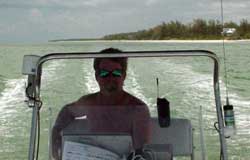
- Complete the Predeparture Checklist
- Review the Chart or Map of the area you will be visiting
- Check the local Tide Chart
- Check the Weather forecast
- Check your boat equipment?electrical, mechanical, docking lines, life vests, first aid kit
- Check your Fuel level and always have more than you expect to use
- Be sure you have communications equipment onboard ? VHF radio, cell phone
- Be sure you have proper identification for everyone on board and fishing license for each angler
- Bring ample food and especially extra fresh water
- Bring extra clothing and foul weather gear
- Perform a Vessel Safety Check
- Always conduct a predeparture safety meeting and show your guests the location of life vests on your vessel and how to use them. Also show them how to use the VHF radio and where your first aid kit is.
- All children should wear a life vest and the captain should wear one if boating alone.
 For More Information:
For More Information:
- Boat Ed is a boating safety education & course website with topics such as knowing your boat, safety equipment, emergency preparedness, etc. You do not have to take the course, just browse this invaluable site.
- FWC Boating Regulations details Florida's rules and regulations
- Florida Boaters Guide published by Boated.com
- Boating Regulations on Florida GoFishing
- Boating Courses on Marine Waypoints
- Boating Knots on Marine Waypoints
Fuel Considerations
 Marine fuel is always more expensive at a marina than at the gas station but it is the only place to purchase non-ethanol gasoline these days.
Marine fuel is always more expensive at a marina than at the gas station but it is the only place to purchase non-ethanol gasoline these days.
Always top off your tank and know how far you can go on a tank so you do not run out of fuel.
The fuel sales pictured here was after a trip to an offshore reef 110 miles out with the total trip of 230 miles. The boat was a 36 foot Yellowfin with 3 Mercury 300's. On this 100 mile out trip they caught Mutton Snappers, Grouper, African Pompano, and the catch of the day was an 80 pound Wahoo caught on 50 lb Power Pro line.
A Word on Ethanol
Due to the recent addition of Ethanol to gasoline, you must purchase gas for your boat from a marina that sells non-ethanol gas. Ethanol rapidly separates in the heat and fouls your fuel supply, it also rapidly deteriorates your fuel lines and fuel tank. The conditioners they sell to treat the ethanol gas only work if you use your boat several times a week; if you don't use your boat that often, you will have problems. So be safe and use only non-ethanol gasoline available at your local marina.
Tides and Boating
 Florida tides run an average of 4 feet from high to low tide. It is important to check the tides before you go boating.
Florida tides run an average of 4 feet from high to low tide. It is important to check the tides before you go boating.
Fast moving tides can also make operating your boat difficult, especially during docking. Don't let our calm waters fool you, some tidal currents are strong enough that some boats cannot make headway against the current. Trying to get back into Naples Bay from the Gulf can be a hair raising experience in a small boat. Many bays and waterways close to land empty out during low tides and it is not easy to see an oncoming sandbar.
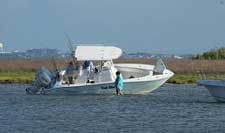 Some waterways can become very hazardous during low tides, so educating yourself with a good chart and knowledge of the day's tides helps ensure a great boating day. A common rule of thumb with the locals is to avoid boating during low tide, or proceed with extreme caution. Getting to your dock and out of the water on your lift can also be a challenge during low tides. A common rule of thumb with the locals is to avoid boating during low tide, or proceed with extreme caution.
Some waterways can become very hazardous during low tides, so educating yourself with a good chart and knowledge of the day's tides helps ensure a great boating day. A common rule of thumb with the locals is to avoid boating during low tide, or proceed with extreme caution. Getting to your dock and out of the water on your lift can also be a challenge during low tides. A common rule of thumb with the locals is to avoid boating during low tide, or proceed with extreme caution.
We have thousands of mangrove islands that are only accessible by boat; boaters just pull their boat up to the beach, anchor in the sand, and fish the shore or sunbath and socialize. It is all to common to see a boat high and dry on the beach because the boat captain did not watch the tide. Another common occurrence is a boat flying through a pass and coming to a skidding stop after hitting a sandbar. You can even hit ground in a marked channel during low tides, especially during Moon Tides.
Florida tides vary by location, so check our Tides & Charts page for more information and clickable charts.
Maps & Nautical Charts
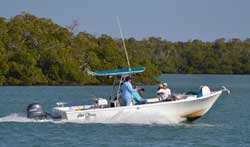 Boaters should use a GPS, compass, and/or have area nautical maps onboard, especially if
Boaters should use a GPS, compass, and/or have area nautical maps onboard, especially if  you are not familiar with the local waters. Staying within nautical markers is encouraged to protect both wildlife and our waterways, and to keep you from getting lost in the back waters.
you are not familiar with the local waters. Staying within nautical markers is encouraged to protect both wildlife and our waterways, and to keep you from getting lost in the back waters.
It is also very easy to get lost in the 10,000 Islands or any mangrove island cluster, they all look alike, so use your charts! See our Tides & Charts page for more information.
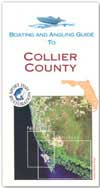
The free Boating and Angling Guides by FWC are a great resource and includes information on speed zones, marinas and public access boat ramps, and seagrass and mangrove locations. They have guides for water bodies around Florida, with most Counties available. They also have guides by specific area like Biscayne Bay.Get your map at the Florida Fish & Wildlife website or pick one up locally.
There are also books published that have invaluable information such as anchorages, marina's, and nautical charts.
Marine Radio
Having a working marine radio onboard and turned on, especially when offshore, is always advised. Learn to use your radio and leave it On set at Channel 16 so you can monitor area activity.
| Channel | Description |
| 9 | Working Channel, secondary calling channel |
| 13 | Bridge to Bridge |
| 16 | Hailing and Distress Broadcast Channel, monitored 24 hours by the Coast Guard, use this channel only for hailing or emergencies, not intended for casual conversation |
| 24 - 28 | Public Coast Stations |
| 68, 69, 71, 72 | Working Channels open for pleasure boaters communications |
| 1, 2, 3, 4 | 24 Hour Weather Channels |
When hailing on the radio use the FAA Phonetic alphabet to communicate.![]() FAA Phonetic & Morse Code Chart
FAA Phonetic & Morse Code Chart
Other important words to use during your transmission on a VHF radio include:
- Mayday for Help
- Affirmative for yes
- Negative for no
- Stop for end of sentence
- Roger for I understand or acknowledge
- Over for ending transmission
Avoid Groundings
 The waters on the Gulf of Mexico, inshore locations, and around inlets can be very shallow, so knowing your depth of the water and the tides is very important to avoid grounding. This is a common, everyday event here, especially during low tide.
The waters on the Gulf of Mexico, inshore locations, and around inlets can be very shallow, so knowing your depth of the water and the tides is very important to avoid grounding. This is a common, everyday event here, especially during low tide.
Knowing the tides, staying within markers, referring to nautical maps and depth-finders can help you avoid groundings.
Use your eyes as a guide:
Learn to Read the Water
- Brown, Brown, Run Aground. Avoid brown areas! This water color indicates that reef formations or seagrass beds are close to the surface.
- White, White, You Just Might. Use caution! Sand bars and rubble areas may be much shallower than they appear.
- Green, Green, Nice and Clean. Green waters are generally safe for shallow draft boats, larger, deeper draft vessels should exercise caution.
- Blue, Blue, Cruise On Through. Clear sailing in deep water areas.
For more information on Tides & Boat Groundings.
Anchoring
When anchoring your boat always do so on sandy ground. Do not anchor on reefs or in delicate sea grass, this can cause damage and bring you some hefty fines if caught. If buoys are available use them and their presence usually means it is not safe to anchor.
Divers Down Flags
Florida law requires all divers and snorkelers display a dive down flag when exploring our waterways. Boat operators should always scan the area for divers dive flags outside of channels. Laser radar is used by law enforcement determine if boats maintain the 300 foot distance from down flags and they are happy to issue fines. Law enforcement also uses this same radar to fine snorkelers and divers when they stray over 100 feet from their flags. Watch this FWC video to learn all the details.
Prepare for Hazards and Emergencies
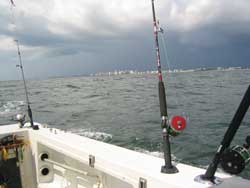 Many vacationers or experienced locals can sometimes be complacent because our weather SEEMS beautiful all the time and our waterways calm. Always check the weather before you go boating.
Many vacationers or experienced locals can sometimes be complacent because our weather SEEMS beautiful all the time and our waterways calm. Always check the weather before you go boating.
Florida is the thunderstorm capital of the world. There is no such thing as a lightning proof boat. If you see lightning, get off the water and out of the boat.
If you are the Captain of the boat, you are responsible for all passengers on board, so knowing the hazards and preparing for them will ensure a safe trip. We have put together a webpage with common Hazards to Avoid, please review this before venturing out on the water.
Leave No Trace Practices
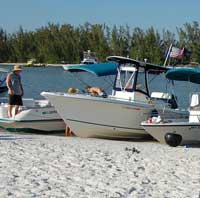 In order to keep our waterways and beaches pristine, always follow "Leave No Trace" practices. This involves everyone's conscious effort to keep our county in pristine condition and our wildlife safe.
In order to keep our waterways and beaches pristine, always follow "Leave No Trace" practices. This involves everyone's conscious effort to keep our county in pristine condition and our wildlife safe.
When boating, do not throw anything overboard. If you see trash in the water or you accidently drop something into the water, please retrieve it. Trash in our waterways endangers aquatic life and pollutes the waters. There are hefty fines for littering, so don't do it.
For more information visit our Leave No Trace page.
|
|---|
Maintain & Clean Your Boat
Keeping your boat's clean and in good repair will insure your safe return from you boating & fishing adventures. Breaking down can ruin your day and if you need towing, very costly. Always perform a vessel check before you leave the dock. Visit our Predeparture Boating Checklist page and to ensure a safe trip.
Clean your watercraft to prevent the spread of invasive species. Area's on your boat to target are shown below-click the picture to see it in more detail.
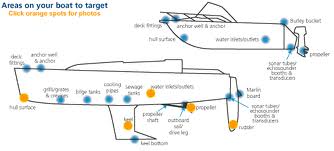 |
| Source: http://www.biosecurity.govt.nz/biosec/camp-acts/marine/cleaning |
Marine pests can:
- Damage your boat
- Increase your fuel and maintenance costs
- Impact on fishing
- Destroy the marine environment
- Threaten human health
Visit our Invasive Species section for detailed information.
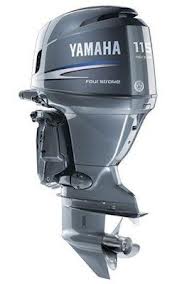
Flush You Motor After Every Trip!
Most boat owners do not realize that your boat motor must be rinsed with fresh water after EVERY trip! Florida's fine salt crystals can build up in your water lines and clog the motor and corrode your motor. Here's a sad fact, if you do not flush your motor, within one year you will be buying a new motor! Larger boats usually come equipped with quick attachment for a hose, smaller boats need to use a rabbit ear attachment to flush their motor. Big or small, all boat motors need rinsing after every trip.
Keep Your Boat & Trailer Secure
Collier County Sheriff's department has a program calls Dock It and Lock with it's main purpose to educate the public to prevent your boat from being stolen. Naples has a lot of large boats that smugglers target for theft. It is not uncommon to see suspicious boats in the middle of the night patrolling our waters and trespassing our docks. If you suspect criminal activity call Crime Prevention 239-252-0700.
For more information on this program jump to http://www.colliersheriff.org. Every boat owner should watch this video.
Special Fishing Rules for Vessels
 Fishing in Florida can be a very rewarding experience. Locals know the rules well and follow them because law enforcement is very strict and always watching you. See our Fishing Regulations page for more details. Here are a few important rules to know when fishing on your boat.
Fishing in Florida can be a very rewarding experience. Locals know the rules well and follow them because law enforcement is very strict and always watching you. See our Fishing Regulations page for more details. Here are a few important rules to know when fishing on your boat.
Each person on board a vessel who is fishing must have a fishing license unless they are on a fishing charter or Exempt.
Your catch must remain in whole condition until landed ashore (heads, fins & tails intact). Please refer to the Florida Saltwater Regulations guide for the specifics on each species.
Always know what your fish is and the rules that apply to it before keeping it. You should also refer to the list of Prohibited Species before fishing.
Do NOT bring tarpon or Goliath grouper on board your boat. New state and federal guidelines PROHIBIT this activity. Release them while still in the water.
All vessels fishing in federal waters (9 miles on the Gulf, 3 miles Atlantic & Keys) must have aboard venting and dehooking tools and non-stainless steel circle hooks when using natural baits for the purpose of reducing mortality in reef fishes, including Snapper and Goliath Grouper. For information on these tools, see our Catch & Release page.
Catch and Release
Freshwater anglers are encouraged to practice Catch and Release to preserve our freshwater populations. For information see our Catch & Release page.
Regulations
 We don't mean to be stuffy, but in order to ensure our waters remain safe and enjoyable, know Florida boating and fishing regulations before you venture out. The information provided on Florida Go Fishing with give you an overview of our regulations. See Boating Regulations and Fishing Regulations.
We don't mean to be stuffy, but in order to ensure our waters remain safe and enjoyable, know Florida boating and fishing regulations before you venture out. The information provided on Florida Go Fishing with give you an overview of our regulations. See Boating Regulations and Fishing Regulations.
State waters extend to 9 nautical miles on the Gulf, 3 nautical miles on the Atlantic & The Keys, and federal rules apply beyond state waters.
Vessel operators should always be considerate of other vessel operators even when stopping to anchor or moor. And always watch your speed and your wake. To avoid unnecessary delays and fines, read up on our rules, follow posted speed zones, stay out of restricted areas, follow the boating rules and regulations and keep your boat in excellent condition.
Vessel Inspections
 Marine law enforcement from several agencies are active on our waters and will periodically pull you over and perform a safety inspection of your watercraft.
Marine law enforcement from several agencies are active on our waters and will periodically pull you over and perform a safety inspection of your watercraft.
Before departing always perform a Vessel Safety Check to be sure your boat complies with county, state, and federal rules and regulations. Your vessel can and will get pulled over for a safety check. You can get a free vessel check, see below.


